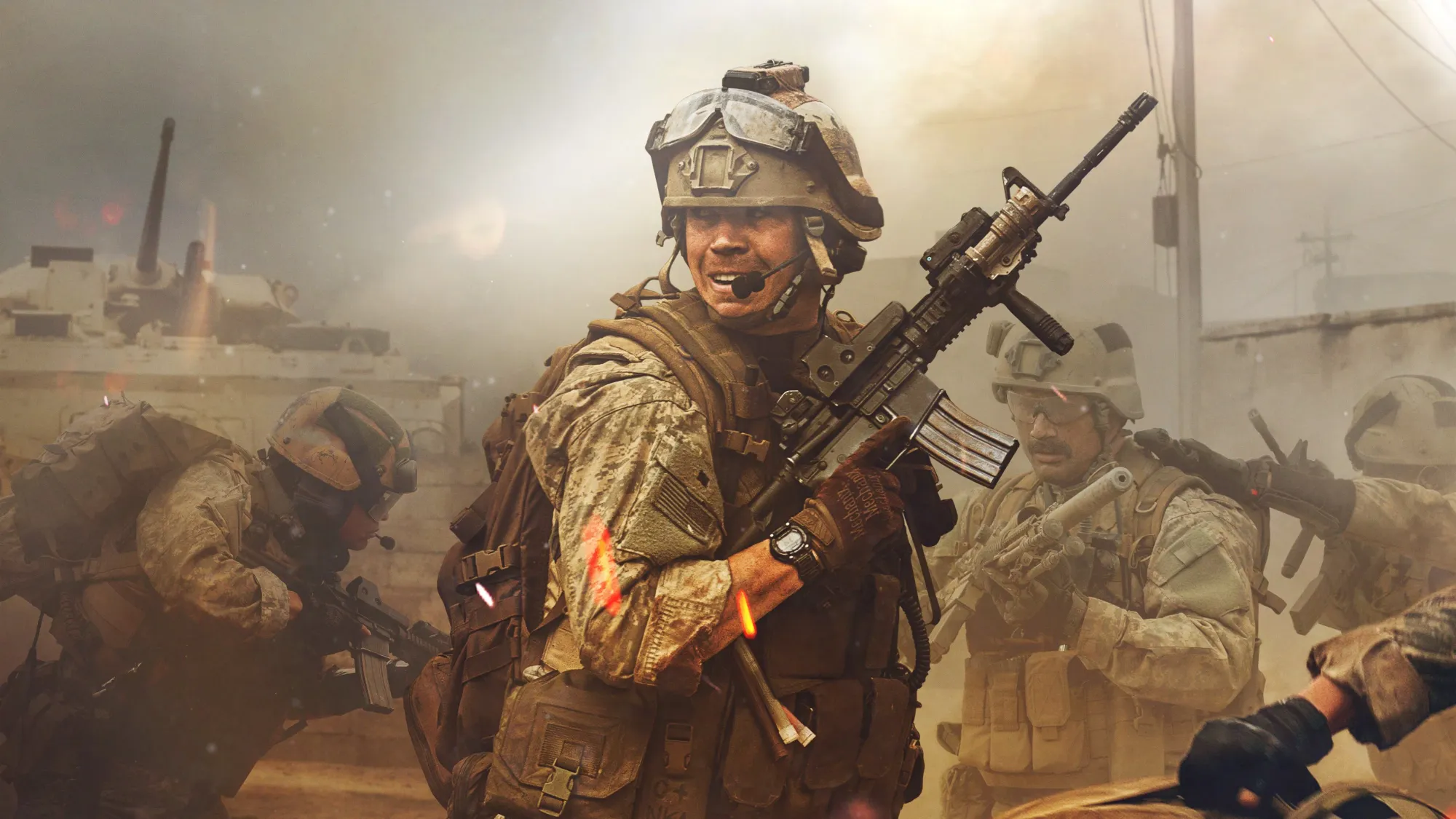Show of Force: Warfare Will Shake You Out of Your Skin
Written and co-directed by an Iraq war veteran, meet the combat movie that’s so authentic, it’s being compared to Saving Private Ryan.
good.film
8 months ago

Share

Warfare doesn’t so much tell a story – it detonates one. Co-directed by Alex Garland (who made last year’s bone-dry Civil War, which we wrote about here), the real creative force behind Warfare is co-director Ray Mendoza – a former Navy SEAL who fought the very same sequence of events that make up the film.

According to IMDb, Warfare is the first studio film to show the Battle of Ramadi, often cited as the bloodiest battle fought in Iraq. Obviously that’s subjective, but here’s where Warfare is a fascinating cinematic experiment. The film is built directly from the memories and testimonies of Mendoza and his team, some of whom lost their limbs and even their lives. Every detail was verified by those who were there, and meticulously reconstructed for the screen.
After working together on Civil War, Garland & Mendoza bonded over a shared goal: creating an unflinching and unglamorized war film that’s as realistic as possible. Something that pays deep respect to the men at its core, while stripping away the artifice of a slick Hollywood production. Take if from us, it’s mission accomplished with Warfare.
From minute one, we’re thrust into the sweaty waiting, then the smoky chaos of this Navy SEAL mission (which took place in 2006) with a documentary-like immediacy. There’s no patriotic score. No grizzled General barking out backstory or context to get us settled in. Just a ticking sense of foreboding… followed by the sheer, unfiltered panic of survival. If there’s any film on Earth that “puts you there”, it’s Warfare – and it’s got one more trick up its sleeve.
What sets Warfare apart from other war films?
From the title drop, every tense moment of Warfare plays out in real time. There’s no snappy montages or cruisy dissolves to pass the time: the entire film is the exact duration of this real life mission. It means that there’s a very unique feel to the film’s first act: almost no action, just tension. After the platoon infiltrate a home in the night – with translators telling the Iraqi family who live there to keep calm and quiet in their beds – we sit with this team and wait. Zero music. Zero gimmicks. Just gum being chewed and sweat trickling down greasy brows.
It takes a risk-averse studio like A24 to be cool with the first half-hour of their war film showing… basically nothing, except watching and waiting. But it’s gripping, because every moment is laced with the potential for attack. There’s a real air of the unknown. Hats off to the sound designers: the cacophonous surround-sound FX (when the action does arrive) are elite, but so are the moments in Warfare that are so silent, you can hear the fan whirring in the movie projector. And probably, your own heartbeat.
As Navy SEAL platoon ‘Alpha One’ surveils a market across the street, it’s clear they're a bonded unit. There’s trust there. The tight and decisive way they swap commands, the shorthand they’ve developed as a crew. You can’t help but wonder what kind of missions came before this one to forge that bond (it’s something the cast emulated, eating every meal together and sharing the same hotel to develop the sense of camaraderie the real SEAL team had). What’s interesting is how their various personalities still emerge without backstory. We don't know where these guys are from or their stories, but we can easily read their roles: the leader, the dissenter, the fearful, the strong.
It creates space for thoughts to occur like, What's it like for these adrenalised men? Is this what they signed up for – squinting through scopes at foreigners buying fruit, while terrified children huddle in the room next door? As the SEALS crack jokes and adjust their haunches, it hits you how young most of this platoon are: some as young as 20, most no older than 25. Rewind a few years, they’d be getting their drivers’ permits. Watching their sweaty fingers twitching on a rifle trigger is a little alarming – but that’s nothing compared to the IED explosion that kicks off the film’s second act. That’s when all hell breaks loose.
How does Warfare show the realities of combat?
It’s a trivia night nugget that the glamour of Top Gun caused Navy recruitment to spike up. We wonder if Warfare might have the opposite effect? Time after time, Garland & Mendoza emphasize the confusion and fear of this operation, leaning into authenticity and away from Hollywoodness. The immediacy of the filmmaking carries a subtext that seems to shout See? This isn’t sexy. This isn’t aspirational. This is madness!
After the sudden street explosion that rips through their platoon, the movie’s soundscape transforms: it’s like being underwater with scuba gear on. Flat muffles and thumps as the team stagger through haze and dust to latch onto… anything. Just to get their bearings. They’ve gone from a support team, to a platoon that need urgent support themselves.
Through the blood and smoke, the soundtrack becomes a cacophony of urgent radio comms and men crying out in pain and confusion. It’s deliberately designed to overwhelm us, and it's effective. Similarly, Warfare is jam-packed with jargon that adds to the super authentic feel. It’s obviously been driven by lived experience, and co-director Ray Mendoza admits that he and his crew put a lot of work into getting this right. “Comms was super important to me”, said the Veteran on Reddit, “because I was a lead communicator and JTAC” (Joint Terminal Attack Controllers are trained ground troops that call in air support from aircraft).
Twice, the platoon’s JTAC Ray (Emmy nominee D'Pharaoh Woon-A-Tai) calls in what’s called a “show of force” – essentially, a USAF jet rips through the streets at extreme speed, flying extremely low. The name fits. The volume and impact – yep, the sheer force of it – is shockingly powerful, almost sickening. Warmongers might think, So what? It’s a battleground. But hold up – this is a neighbourhood. Take a moment to imagine this happening outside your own house: it’s unthinkable, unwarranted, morally unacceptable. Yet here, it’s a Tuesday. It’s a powerful (and bone rattling) statement from an “apolitical” film.
How does Warfare address the impact of war?
If you’re a bit shy with injury detail, Warfare probably ISN’T the big screen outing for you. But it’s important to the story – not so much the physical injuries, but the impact they have on this outfit psychologically. In one scene, between his screams, Sam (Joseph Quinn) overhears Ray’s radio call for “urgent EVAC, severely wounded” and pleads in a panic, “Who's the severely wounded? Is it me!?” knowing that’d probably be a death sentence. Watch the look on Ray’s face when, in the moment, he chooses to lie to his teammate – “No! It's NOT you.”
In another scene, the squad’s captain Erik (Will Poulter) takes his 2IC aside, admitting to him that’s he’s shaken up too badly to continue his command. It’s a fascinating admission – can you imagine this happening in 80s testosterone-fests like Rambo or Predator? – made more impactful by the look on Erik’s face as the words come out. This team are clearly physically prepared, but mentally? That’s another thing entirely.
A far smaller but critical presence in Warfare are the Iraqi family members who’ve been forced to sit by as this mayhem unfolds in their home. Essentially short-term hostages, they aren’t targets of the troops or pose any threat. They just lived in the wrong house on the wrong night. When the wife & mother screams at the embattled platoon “WHY!? WHY!?!” as they finally retreat, well, frankly we're wondering the same. What was the point of any of it? If you’re waiting for a typical Hollywood resolution, it doesn’t come. There’s no grand reveal that makes it all make sense. And again, that’s very much the point.
With a story like this – real people, real events – there’s a grey area: mining people’s traumatic past for entertainment. Is there a cost to unearth these memories? Is that cost worth it, for the insights they bring to the rest of us? On the flip side, many of the real Alpha One platoon were on set to help the actors during the shoot, and found the process of making Warfare cathartic. When asked if filming resurrected any trauma for him, Mendoza replied: “Trauma, no. Memories, yes. I had to detach myself because as co-director I had responsibilities that kept me from living in an emotional state while on set, [but]… There were a couple of exceptions.”
So - what’s the takeaway from Warfare?
With our globe balanced on a geopolitical knife’s edge, patriotic propaganda starring immortal Hollywood heroes might be the last thing the defence force needs. Warfare feels like the antidote to that dated approach – a dose of reality that reminds us of war’s awful repercussions. And for those of us who’ve never faced the horrors of combat, watching this is an instant way to gain an understanding of the memories that Veterans might be carrying.
Looking back over the notes we scribbled watching Warfare (when we could tear our eyes off the screen), one word keeps recurring: REAL. There's a lived-in feel to everything; the guns are scratched, the props feel real. The tattered curtains drift in the Iraqi breeze like they’ve been hanging there for years. When the action kicks off, it’s very visceral, very intense, and the impact lingers long after the smoke clears. It’s surely one of the most effective real-time movies ever made.
What sets Warfare even further apart is its unblinking portrait of modern combat. It flatly refuses to glorify heroism – there’s no rippling muscles or winks to camera from the hunky lead. It’s a film that’s stripped of spectacle; presented as fact. It’s making the point: does geopolitical context really matter when bullets are flying and slamming past you by inches? Does the family whose house is destroyed get any explanation to justify their lives and home being ripped apart?
Warfare takes a harrowing reality and makes it starker with the stance that sometimes, there are no justifications. No sense or reason. This battle was barely a blip in the bigger picture, and far from sexy. Unlike Top Gun, there won’t be any Navy recruiters signing up eager new fodder here, ready to become a “hero”. And that's a good thing. Rather than glamourizing battle for pumped-up jocks, Warfare speaks instead to the kind of people we need solidly defending our nations: troops with a moral compass. And in a warzone, that may just be the most crucial asset of all.


